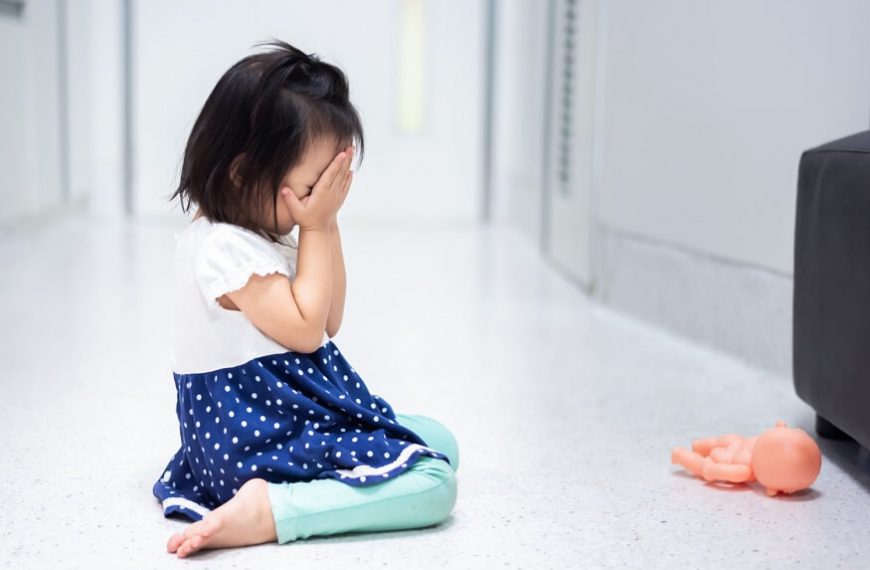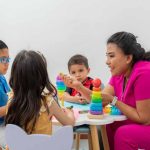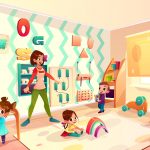Preschool teachers, we hear you! We know dealing with separation anxiety in toddlers is tough. Especially in this post pandemic world. With most parents swinging a work-from-home 9-5, children are now used to spending 24×7 with their parents, unlike before when they got parent-free time while their parents were away at work.
It is not surprising then that instances of separation anxiety in kids have increased manifold post pandemic. Most children feel reluctant to leave their safe haven of a home behind and go back to their preschool or kindergarten. Which means that you, our fellow teacher, have your work cut out for you.
Easing separation anxiety during a toddler transition program might seem next to impossible but it is not. Let us help you out!
What is separation anxiety in toddlers?
Separation anxiety in toddlers arises when they have to spend too much time away from their parents. This could also extend to their caregivers or any loved ones that they are particularly attached to.
You see when kids turn 18 months old, they develop the awareness that their caregiver is not with them, which makes them wonder where their caregiver could be. It is at this age that they may start developing what is known as separation anxiety in toddlers.
The good news is that not all kids go through this, and those who do, well, there are ways to manage their anxiety.
Symptoms of separation anxiety in toddlers
Separation anxiety can manifest itself in various ways in toddlers. Here is a list of symptoms, which if you notice, you might conclude that a child is facing separation anxiety:
- Temper tantrums when separated from their prime lifegiver
- Worrying when their loved ones are not around
- Fear of being alone or on their own
- Headaches, tension aches and even stomachaches
- Clingy behaviour
These are just some of the symptoms that indicate separation anxiety in toddlers. It is best to consult with a child psychologist for more.
How to handle separation anxiety in toddlers?
Now let us come to the main section of this blog. If you think about how to handle separation anxiety in toddlers, it might feel like a very, very daunting task. However, worry not, dear teacher. We have compiled a list of easy-to-pull off techniques that can definitely help anxious students feel calmer and more at home.
- Get parents to visit the school before their child’s first day
- Greet kids and their parents at the beginning and end of each school day
- Acknowledge what toddlers feel
- Encourage kids to bring a comforting item
- Partner up the kids of your class
- Make a wall of family photos
Ask them to bring their toddler along as well. Treat it like an orientation day where you get both parents and their baby comfortable with your preschool. You can let the child explore and play in the play area so they feel more at ease the next time they have to come here. A little bit of a healthy distraction and time away from their parents can ease the transition process.
You know kids love a good routine! By establishing the ritual of greeting each parent and their child, you give the kid the chance to say goodbye and their parents the opportunity to reassure their child that they will be back soon. Just be sure not to drag out these meetings or the toddler might become very unwilling to say goodbye.
Spend some time sitting with the toddler and letting them tell you exactly how they feel. Once they are done, you can soothe them by reassuring them that their feelings are normal and that they will be reunited with their loved ones pretty soon.
Like a security blanket! Or a small stuffed animal. Items like these can bring a sense of familiar comfort to the child, thus helping them relax.
Often separation anxiety stems from the feeling of being alone. However, by partnering up with the kids of your class, you give each child the chance to make a friend whom they can get comfortable with. You can let children pick a new partner of their choice each day so they become friends with everyone.
You could dedicate one section of your classroom wall as a family photo wall. Ask parents to submit a picture of them as a family, and hang it up in a spot where it is easy for your preschool students to reach them. Seeing the familiar faces of their family might make children feel comfy.
At EuroKids, we make toddler transition super fun and super easy
Our toddler transition program has been designed to put both parents and their kids at ease! We understand this journey from home to school can be a rough one for both parents and their tiny tots. Hence, we have come up with a well-thought out transition program that has been tailored to make this new phase of life as smooth as possible for kids and their parents. Here are the key details and features of our program:
- The age group of our program is 18 to 24 months, which is the perfect time to help children get accustomed to a new, school-like environment
- We offer a 1-week settling-in period so both parents and kids can adjust to this new change
- We keep our session durations short so kids can gradually adjust to being away from their parents in a healthy fashion. Each of our sessions is 120-mins long and occurs 5 times per week. We conduct a total of 100 sessions per child so they can truly transition from home to preschool with minimal fuss and hassle.
- We also follow a structured 20-week curriculum, which helps develop the cognitive and motor skills of your child.
- We maintain a very healthy teacher to toddler ratio of 1:6 ensuring that all kids get due attention and none of them feels left behind. Our toddler to support staff ratio is also the same, thus ensuring your child is well taken care of.
- Finally, our highly educated, trained and experienced all-female staff has the skills required to make your child feel right at home.
Despite the odds of your toddler facing initial separation anxiety, the benefits of enrolling your child in our toddler program are great. Not only do your kids get the best care and exposure to sensory learning methods which work towards improving their cognitive and motor skills; but it also reduces the chances of getting severe separation anxiety by transitioning straight to preschool. If you want to know more about our program, make sure you visit any of our branches nearest to you.















